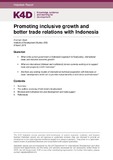| dc.contributor.author | Quak, Evert-jan | |
| dc.coverage.spatial | Indonesia | en |
| dc.date.accessioned | 2020-01-02T11:54:51Z | |
| dc.date.available | 2020-01-02T11:54:51Z | |
| dc.date.issued | 2019-03-08 | |
| dc.identifier.citation | Quak, E. (2019). Promoting inclusive growth and better trade relations with Indonesia. K4D Helpdesk Report 545. Brighton, UK: Institute of Development Studies | en |
| dc.identifier.uri | https://opendocs.ids.ac.uk/opendocs/handle/20.500.12413/14957 | |
| dc.description.abstract | This rapid review synthesises the literature from academic, policy, and knowledge institution sources on the political economy of Indonesia, concerning recent inclusive growth efforts in Indonesia. It can be concluded that the transformation of Indonesia’s economy to a more resilient economy, which is integrated within the Asia region, has been successful and gained the country more global political powers. However, the economic literature on Indonesia remains limited, and “studies that provide a comprehensive and integrated macroeconomic analysis are particularly scarce” (Breuer & Kinda, 2018, p.3). Still much of the existing recent literature focuses on the periods leading into either the Asian financial crisis or the global financial crisis. The literature used in this review, showed that: a) Indonesia’s economic policy seeks stability before growth, b) The country has a favourable demographic trend of increasing the working population until 2030, and with healthy urbanisation rates, which could increase market development, c) Indonesia reduced poverty levels by half to 11% between 1996 and 2016, but this trend has slowed down in recent years, d) Indonesia faces a challenge with low tax revenue, which has limited the Government’s ability to increase public investments in infrastructure, health and social safety nets. Indonesia’s investment gap is larger than in other countries in the Asian region, and e) the country faces a low level of Foreign Direct Investment (FDI). Low participation in global and Asian value chains limit Indonesia’s ability to tap further into the growing Asian consumer market, complicating the transition from a commodity-dominated economy to a more innovative, services-oriented economy. | en |
| dc.language.iso | en | en |
| dc.publisher | IDS | en |
| dc.relation.ispartofseries | K4D Helpdesk Report;545 | |
| dc.rights.uri | https://www.nationalarchives.gov.uk/doc/open-government-licence/version/3/ | en |
| dc.subject | Economic Development | en |
| dc.subject | Governance | en |
| dc.subject | Trade | en |
| dc.title | Promoting Inclusive Growth and Better Trade Relations with Indonesia | en |
| dc.type | Helpdesk | en |
| dc.rights.holder | © DFID - Crown copyright 2019 | en |
| dcterms.dateAccepted | 2019-03-08 | |
| rioxxterms.funder | Department for International Development, UK Government | en |
| rioxxterms.identifier.project | K4D | en |
| rioxxterms.version | VoR | en |
| rioxxterms.funder.project | 238a9fa4-fe4a-4380-996b-995f33607ba0 | en |

